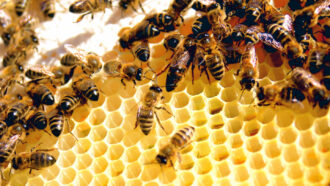fertilizer Nitrogen, phosphorus and other plant nutrients added to soil, water or foliage to boost crop growth or to replenish nutrients that were lost earlier as they were used by plant roots or leaves.
greenhouse A light-filled structure, often with windows serving as walls and ceiling materials, in which plants are grown. It provides a controlled environment in which set amounts of water, humidity and nutrients can be applied — and pests can be prevented entry.
mucus A slimy substance produced in the lungs, nose, digestive system and other parts of the body to protect against infection. Mucus is made mainly of water but also includes salt and proteins such as mucins. Some animals use mucus for other purposes, such as to move across the ground or to defend themselves against predators.
p value (in research and statistics) This is the probability of seeing a difference as big or bigger than the one observed if there is no effect of the variable being tested. Scientists generally conclude that a p value of less than five percent (written 0.05) is statistically significant, or unlikely to occur due to some factor other than the one tested.
probability A mathematical calculation or assessment (essentially the chance) of how likely something is to occur.
statistical significance In research, a result is significant (from a statistical point of view) if the likelihood that an observed difference between two or more conditions would not be due to chance. Obtaining a result that is statistically significant means there is a very high likelihood that any difference that is measured was not the result of random accidents.








